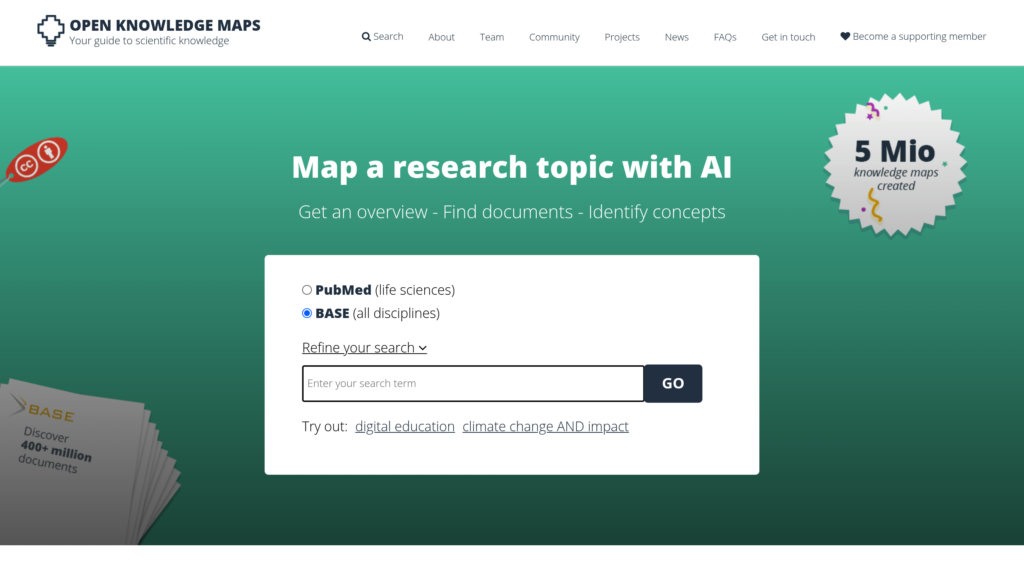Open Knowledge Maps
A non-profit AI-powered visual search engine that creates interactive knowledge maps to simplify and enhance scientific literature discovery.
Community:
Product Overview
What is Open Knowledge Maps?
Open Knowledge Maps is a charitable, open-source platform designed to revolutionize how scientific knowledge is discovered and accessed. It uses an AI-driven pipeline to cluster and visualize the most relevant research documents based on user queries, providing instant topical overviews that highlight key areas and related literature. By integrating large academic databases like PubMed and BASE, it supports multidisciplinary exploration and emphasizes open access content. The platform aims to foster an open, collaborative research environment by enabling users to explore, share, and build upon scientific knowledge efficiently.
Key Features
AI-Based Knowledge Mapping
Automatically generates visual maps clustering the top 100 relevant research documents by topic similarity using natural language processing and machine learning.
Multidisciplinary and Multilingual Support
Supports research across all scientific disciplines and multiple languages, increasing visibility of non-English and diverse academic content.
Open Access Highlighting
Emphasizes open access documents within the maps, allowing users to directly access freely available full texts when possible.
Integration with Major Academic Databases
Connects with large-scale data sources like PubMed and BASE, covering over 300 million documents including articles, datasets, and multimedia.
Community-Driven and Open Source
Developed collaboratively with its user community under an open license, encouraging transparency, participation, and continuous improvement.
Custom Embedding and API Access
Offers services to embed knowledge maps into institutional repositories and discovery systems, enhancing the visibility of specific collections.
Use Cases
- Exploratory Research : Researchers and students can quickly gain an overview of unfamiliar topics and identify key research areas and terminology.
- Literature Review : Facilitates efficient identification of relevant papers by clustering similar documents and separating pertinent from irrelevant content.
- Open Science Advocacy : Supports discovery of open access research, promoting equitable access to scientific knowledge worldwide.
- Academic Libraries and Institutions : Enables libraries and research organizations to integrate visual search tools into their catalogs and repositories for enhanced user experience.
- Science Communication and Education : Helps educators, journalists, and practitioners visualize research landscapes to communicate complex scientific topics clearly.
FAQs
Open Knowledge Maps Alternatives
Heuristica
AI-powered knowledge exploration tool using visual concept maps for non-linear, intuitive learning and research.
Globe Engineer
AI-powered discovery engine that creates structured, visual, and interactive knowledge pages for any topic.
InfraNodus
AI-powered text network analysis platform that visualizes discourse as interactive graphs to reveal insights, structural gaps, and hidden connections.
Flowith
Next-generation AI creative workspace with a canvas-based multithread interface and advanced agent framework for deep work productivity.
Constella
AI-powered second brain app that visualizes and connects your notes seamlessly with secure, local-first storage.
System
An open, comprehensive platform that organizes and relates global knowledge through statistical connections to enhance understanding and decision-making.
Morphik
Open-source multimodal platform for building AI applications that understand and retrieve information from complex visual and textual documents.
Hika
AI-powered search tool designed for deep knowledge exploration with interactive sections and visual knowledge mapping.
Analytics of Open Knowledge Maps Website
🇮🇩 ID: 40.12%
🇨🇳 CN: 7.1%
🇺🇸 US: 4.18%
🇩🇪 DE: 3.29%
🇨🇴 CO: 2.6%
Others: 42.71%
